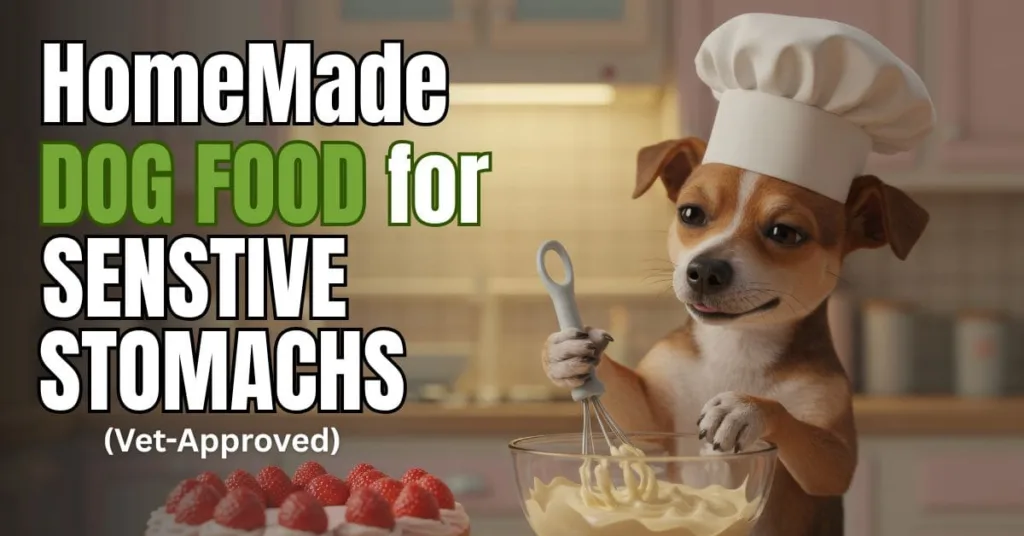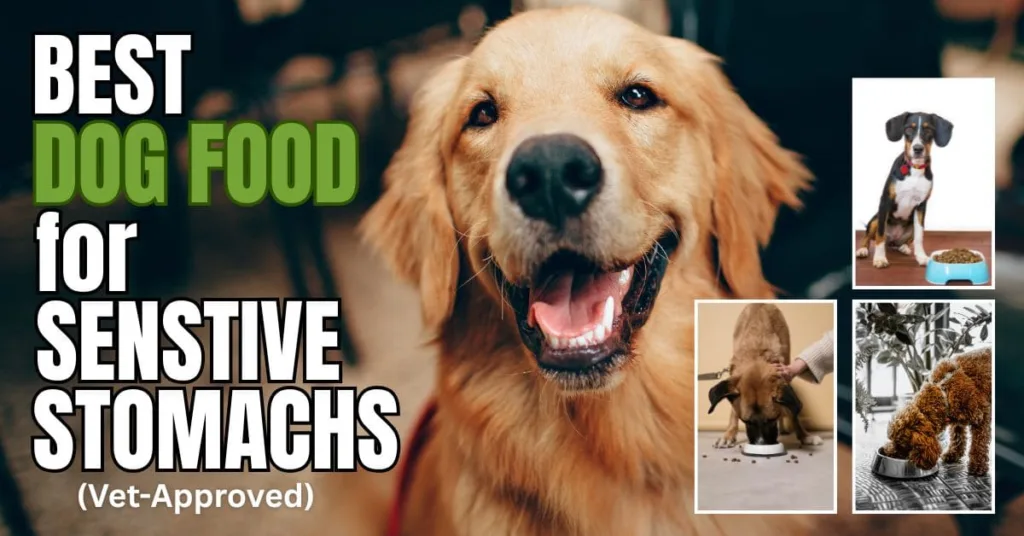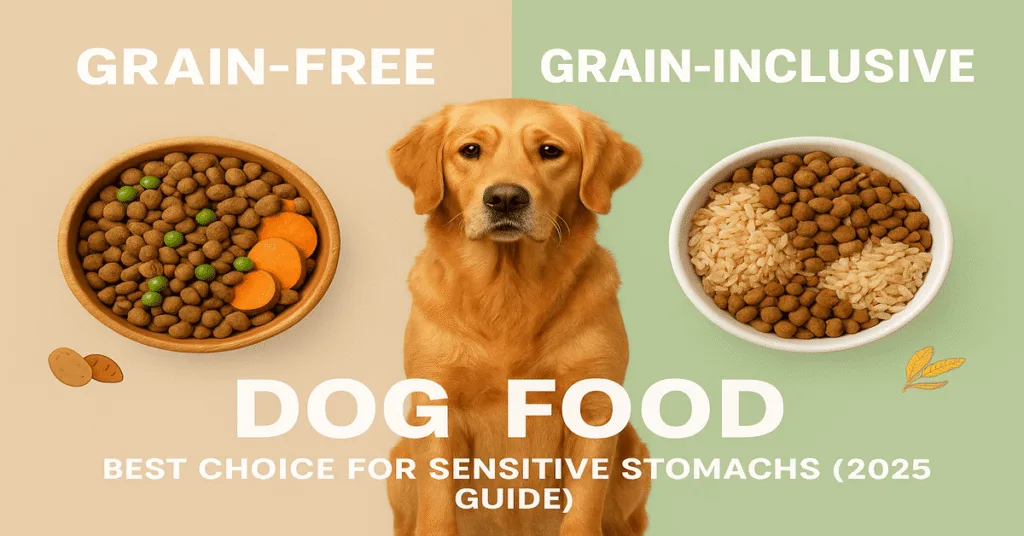Puppies are bundles of joy, but their developing digestive systems can be surprisingly sensitive. If your pup often has loose stools, vomiting, or discomfort after meals, their diet may be the culprit. The right food doesn’t just stop tummy troubles—it also supports healthy growth, energy, and immunity.
In this 2025 vet-approved guide, we’ll explore the best puppy food for sensitive stomachs, common digestive red flags, grain-free vs. grain-inclusive diets, and even safe homemade options.

If you’re looking for sensitive stomach options for adult dogs, check out our complete guide on the best dog food for sensitive stomachs (2025 vet-approved).
Signs Your Puppy May Have a Sensitive Stomach
Puppies with a sensitive stomach often show certain digestive issues. Here are the most common signs to watch for:
- Frequent diarrhea or soft stools → a clear sign their food isn’t being digested properly.
- Vomiting after meals → can indicate food intolerance or difficulty breaking down ingredients.
- Gas, bloating, or restlessness → stomach discomfort that makes your pup uneasy.
- Loss of appetite or refusing usual food → puppies may avoid food that upsets their tummy.
- Dull coat or low energy → poor nutrient absorption affects growth, coat health, and activity levels.
If these symptoms persist beyond a few days, consult your veterinarian. They can rule out medical conditions and recommend the best sensitive stomach puppy food to keep your pup healthy and comfortable.
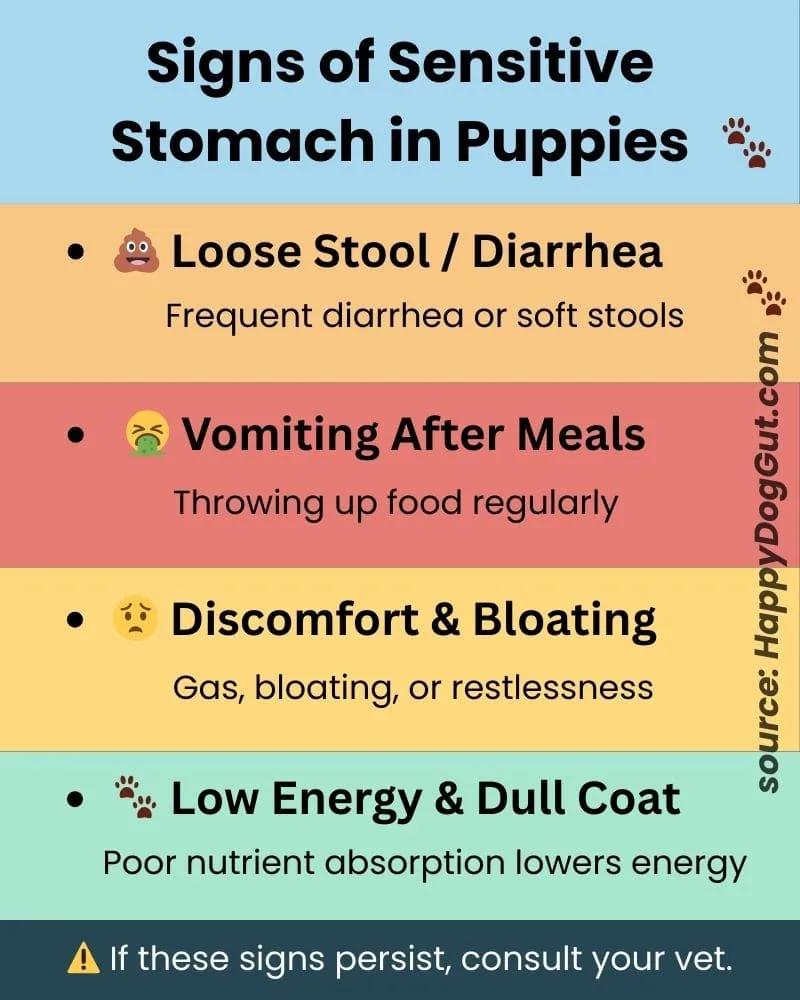
Why Choosing the Right Puppy Food Matters
When it comes to raising a healthy pup, nutrition is more than just calories—it’s the foundation of lifelong health. For puppies with delicate digestion, choosing the best puppy food for sensitive stomachs is especially important. The right formula can:
- Improve stool quality → A balanced diet with gentle, digestible ingredients helps reduce diarrhea and supports firmer, healthier stools.
- Minimize bloating and vomiting → The best puppy food for sensitive stomachs is designed to prevent common digestive upsets, keeping your pup more comfortable after meals.
- Boost energy and growth → Proper nutrition ensures your puppy absorbs essential vitamins, minerals, and proteins needed for healthy development and active playtime.
- Promote healthy skin and a shinier coat → Diets rich in omega fatty acids and probiotics support digestion while improving coat shine and overall skin health.
Starting your pup on the best puppy food for sensitive stomachs not only helps soothe tummy troubles but also lays the foundation for long-term health.
According to the World Small Animal Veterinary Association (WSAVA), puppies should be fed nutritionally complete, highly digestible diets to support healthy growth and sensitive digestion.
Best Puppy Food for Sensitive Stomachs (2025 Vet-Approved Options)
Finding the best puppy food for sensitive stomachs can feel overwhelming, but veterinarians consistently recommend a few trusted brands that are specially formulated to support digestion, immunity, and growth. These formulas use gentle proteins, probiotics, and high-quality ingredients that are easy on your pup’s tummy while still delivering complete nutrition.
Here are some of the top vet-approved sensitive stomach puppy foods in 2025:
1. Hill’s Science Diet Puppy Sensitive Stomach & Skin
- Specially crafted for puppies with digestive issues.
- Uses gentle ingredients that are easy to absorb, improving stool quality.
- Enriched with antioxidants and omega-6 fatty acids for a healthy immune system and a shiny coat.
- Widely recommended by U.S. veterinarians as one of the safest options for growing pups.
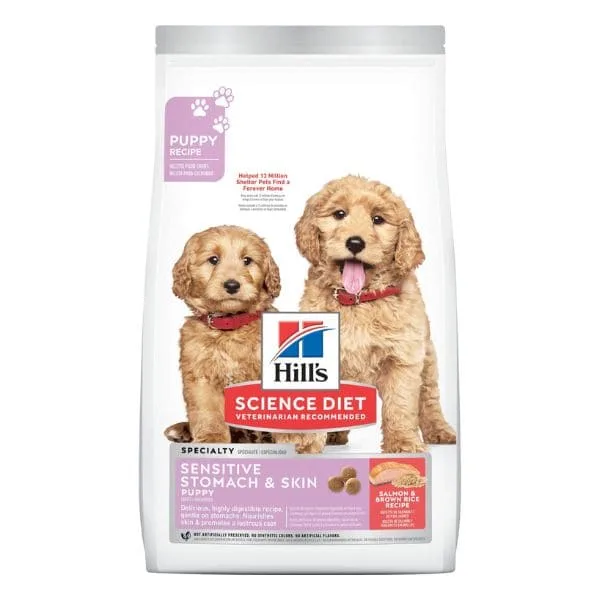
2. Purina Pro Plan Puppy Sensitive Skin & Stomach (Salmon & Rice)
- Features salmon as the primary protein source, which is both tasty and easy to digest.
- Includes rice and oatmeal for gentle energy support.
- Fortified with live probiotics to promote gut balance and better nutrient absorption.
- Excellent for puppies with food sensitivities or dull skin caused by poor digestion.
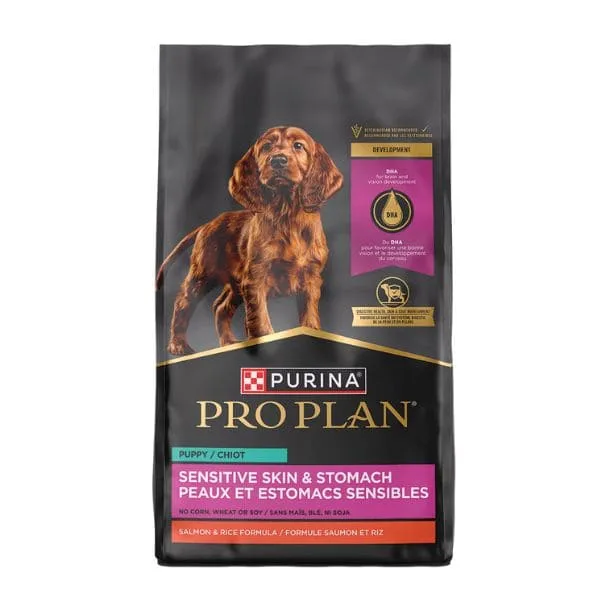
3. Royal Canin Puppy Digestive Care
- Specifically designed for puppies prone to tummy troubles.
- Contains highly digestible proteins and prebiotics to regulate gut function.
- Balanced with vitamins and minerals to support steady growth and development.
- A great choice for pet parents seeking a vet-trusted solution in 2025.
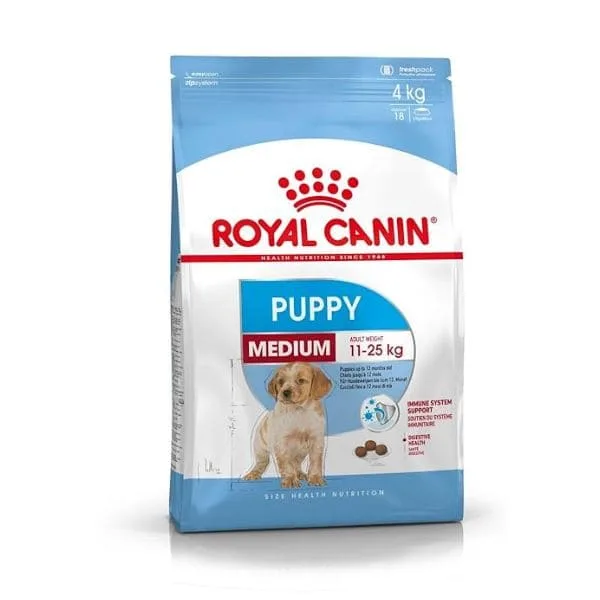
4. Blue Buffalo Basics Limited Ingredient Puppy Formula
- Limited ingredient recipe helps minimize exposure to allergens.
- Uses turkey or salmon as a single protein source.
- Enriched with pumpkin and easily digestible carbs to soothe sensitive tummies.
- Free from corn, wheat, soy, and artificial preservatives — making it ideal for puppies with food sensitivities.
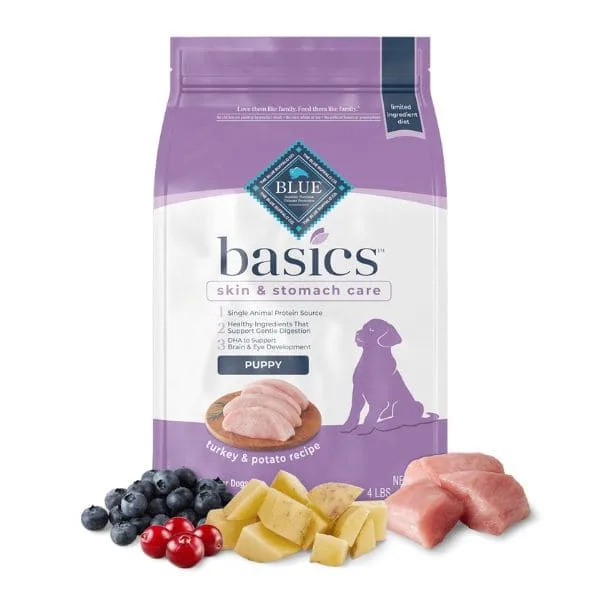
5. Wellness CORE Digestive Health Puppy
- Specifically formulated for gut health with prebiotics, probiotics, and digestive enzymes.
- Features high-quality chicken and wholesome grains for balanced energy.
- Rich in omega fatty acids to support coat shine and brain development.
- A premium option for pet parents who want both gut support and optimal growth nutrition.
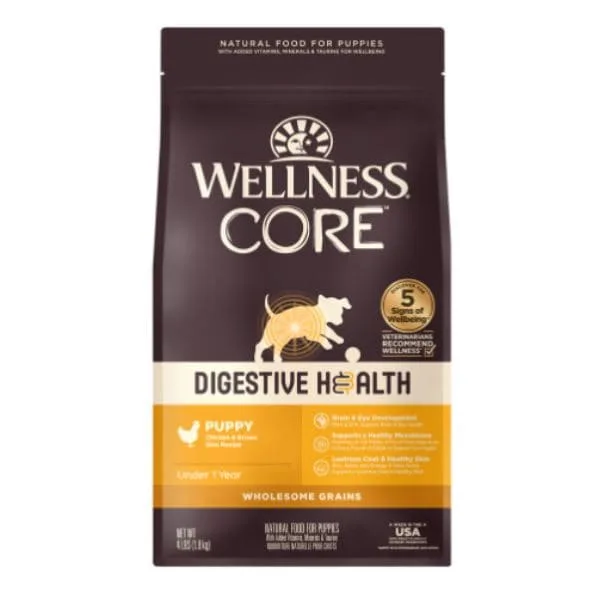
Pro Tip: No matter which option you choose, always transition gradually using the 9–11 day method (mixing old and new food slowly). This prevents further stomach upset and helps your puppy adjust smoothly.
Key Takeaway: The best puppy food for sensitive stomachs should include gentle proteins, probiotics, and easily digestible carbohydrates. Choosing one of these vet-approved puppy diets in 2025 ensures your pup gets the nutrition they need without unnecessary tummy troubles.
You can also check our detailed guide on the best probiotics for dogs with sensitive stomachs for extra gut support.
Grain-Free vs. Grain-Inclusive Puppy Food
One of the most common questions new pet parents ask is whether to choose grain-free or grain-inclusive puppy food—especially if their pup has a sensitive stomach. Both options come with unique benefits and potential drawbacks, so understanding the differences can help you make the right choice.
Grain-Free Puppy Food (Pros & Cons)
Pros
- Often recommended for puppies with grain allergies or intolerance, as it eliminates common triggers.
- Many grain-free formulas are higher in protein, which can support muscle development and growth.
Cons
- Some recipes rely heavily on peas, lentils, or legumes, which may lead to gas and bloating in sensitive pups.
- Certain studies, including FDA research, have linked grain-free diets to potential heart health concerns, though more evidence is still being studied.
Grain-Inclusive Puppy Food (Pros & Cons)
Pros
- Gentle grains like rice and oatmeal are easy to digest and provide steady energy for growing puppies.
- Natural fiber from grains helps promote firmer stools and better digestive health.
- Typically more budget-friendly than grain-free formulas.
Cons
- A small percentage of puppies may have true grain intolerance, but this is relatively rare.
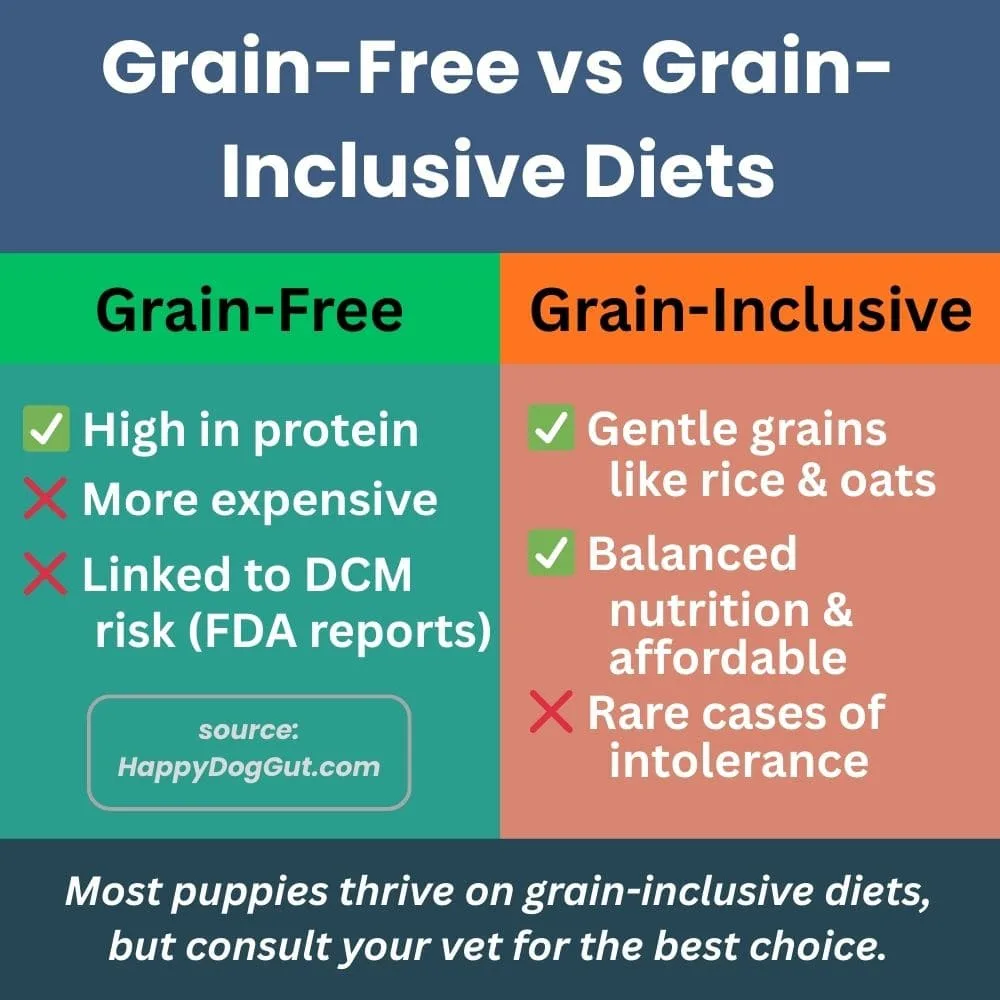
Verdict
For most pups, grain-inclusive puppy food with gentle grains is a safe and healthy option. However, if your puppy shows signs of grain sensitivity, a high-quality grain-free formula may be worth considering.
For a deeper dive into this topic, check out our full guide:
Grain-Free vs Grain-Inclusive Dog Food for Sensitive Stomachs (2025 Vet-Approved Guide)
Homemade Puppy Food for Sensitive Stomachs (Safe Options)
Many pet parents wonder whether cooking at home is better than commercial formulas when looking for the best puppy food for sensitive stomachs. Homemade meals can be a great option because you control the ingredients, avoid unnecessary fillers, and ensure your pup only eats what’s gentle on their developing digestive system.
Some vet-approved, easily digestible ingredients you can safely use include:
- Lean turkey or chicken (cooked without seasoning) → provides high-quality protein for growth.
- White rice or oatmeal → gentle on the stomach and a great source of easily digestible carbohydrates.
- Pumpkin puree → packed with fiber, it helps regulate digestion and firm up stools.
- Carrots and sweet potatoes → rich in vitamins, antioxidants, and fiber to support immunity and gut health.
Always avoid harmful foods such as onions, garlic, fatty meats, or spicy seasonings, as they can upset your puppy’s stomach and even be toxic.
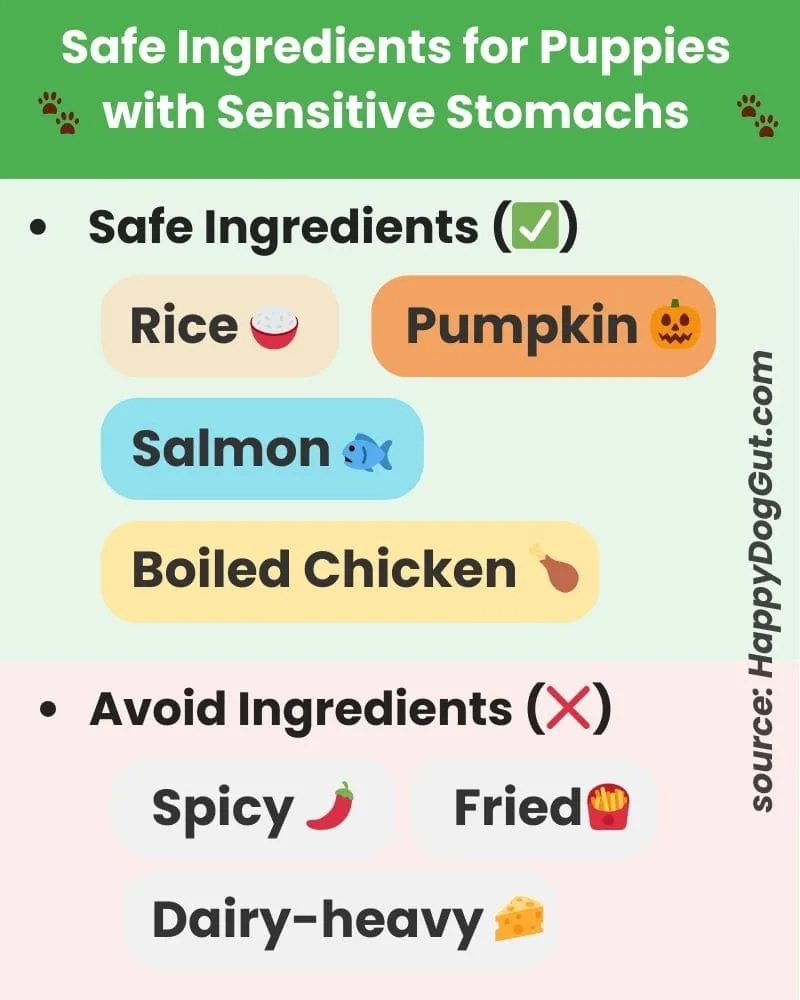
If you’re considering homemade diets long-term, it’s important to work with your vet to ensure meals are nutritionally balanced for growth. Puppies have unique dietary needs, and missing nutrients can affect their development.
Want a complete breakdown of recipes, feeding tips, and safety guidelines? Check out our detailed post:
Homemade Dog Food for Sensitive Stomachs (Complete 2025 Vet-Approved Guide)
Vet-Approved Tips for Feeding a Puppy With a Sensitive Stomach
Feeding a puppy with a sensitive stomach requires extra care and consistency. Even the best puppy food for sensitive stomachs won’t work if meals are given incorrectly. These vet-approved tips can help reduce digestive upset and support long-term gut health:
- Switch Food Gradually (11-Day Rule)
Never change your puppy’s food suddenly. A quick switch often leads to diarrhea or vomiting. Instead, follow the 11-day transition method: start by mixing 25% new food with 75% old food, then slowly increase the ratio until your pup is fully adjusted.- Learn the safest way to transition food in our detailed guide on how to switch dog food without stomach upset (vet-approved and easy to follow).
- Feed Smaller, More Frequent Meals
Puppies with sensitive digestion do better on 3–4 small meals per day instead of one large portion. This helps the stomach process food more gently, reduces bloating, and maintains steady energy levels throughout the day. - Avoid Table Scraps and Fatty Human Foods
Human foods like fried items, spicy dishes, and leftovers can irritate your pup’s gut. Stick to their specially formulated sensitive stomach puppy food to ensure balanced nutrition without harmful additives. - Introduce Probiotics for Gut Health
Probiotics help restore healthy gut bacteria, which improves digestion and stool quality. Many of the best puppy food for sensitive stomachs (2025 vet-approved brands) already contain probiotics, but you can also ask your vet about puppy-safe supplements. - Provide Fresh, Clean Water at All Times
Hydration is just as important as food. Puppies with sensitive stomachs can dehydrate quickly if they have loose stools, so always ensure a constant supply of clean drinking water.
Key Takeaway: Along with choosing the best puppy food for sensitive stomachs, how you feed your puppy matters just as much. By following these vet-approved feeding tips, you can minimize tummy troubles and give your pup the best chance to grow into a healthy, happy adult dog.
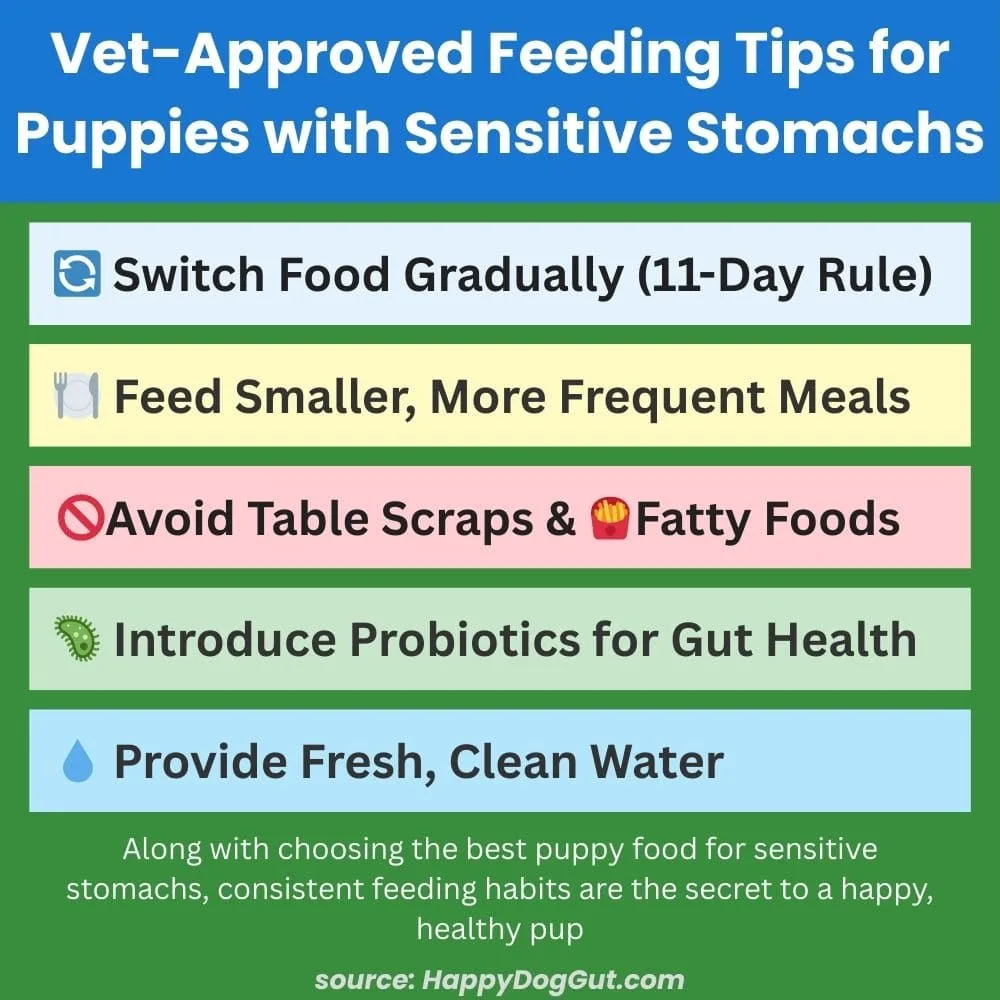
FAQs About Puppy Food and Sensitive Stomachs
What is the best puppy food for sensitive stomachs?
Some of the most recommended options in 2025 include Hill’s Science Diet Puppy Sensitive Stomach & Skin, Purina Pro Plan Puppy Sensitive Stomach, and Royal Canin Digestive Care. These are specially formulated to improve digestion and gut health.
Can puppies eat grain-free food?
Yes, but only if advised by your vet. While some puppies benefit from grain-free diets, most do well with gentle grains like rice or oatmeal included in the best puppy food for sensitive stomachs.
Should I give probiotics to my puppy?
Absolutely. Probiotics help balance gut bacteria, reduce digestive upset, and improve stool quality. Many sensitive stomach puppy foods already contain probiotics.
How do I know if food is upsetting my puppy’s stomach?
Look for signs like diarrhea, vomiting, bloating, or loss of appetite. If symptoms last more than 2–3 days, switch to a vet-approved sensitive stomach formula and consult your vet.
Are homemade diets safe for puppies with sensitive stomachs?
Homemade diets can help, but they must be balanced with the right nutrients. Stick to simple, digestible ingredients and follow a vet-approved homemade guide for safety.
How long does it take to see improvement after switching foods?
Most puppies show positive changes in digestion within 9–11 days of transitioning to the best puppy food for sensitive stomachs, provided you switch gradually.
Can sensitive stomach puppy food help with skin and coat health?
Yes, many formulas contain omega fatty acids that not only support gut health but also improve skin condition and give your puppy a shinier coat.
Final Thoughts
Finding the best puppy food for sensitive stomachs can feel overwhelming, but the right choice can truly transform your pup’s health. By focusing on gentle proteins, easily digestible grains, and vet-approved formulas, you’ll help your puppy avoid digestive upset while supporting healthy growth, strong immunity, and endless energy.

Remember, every puppy is unique. What works for one may not work for another, so monitor your pup closely and consult your vet for personalized advice. Whether you choose a premium commercial brand or carefully prepared homemade meals, the goal is the same—a happy, healthy puppy with a strong digestive system and a bright future ahead.
Hi, I’m Maddy, the writer behind HappyDogGut.com.
I’m passionate about helping Dog parents understand Gut Health, Sensitive Stomachs, and Natural Nutrition for dogs.
Every article I create is vet-approved, research-backed, and experience-driven, so your pup can enjoy a healthier, happier gut.
Happy Gut = Happy Dog!
All content on Happy Dog Gut follows our Editorial Policy.


